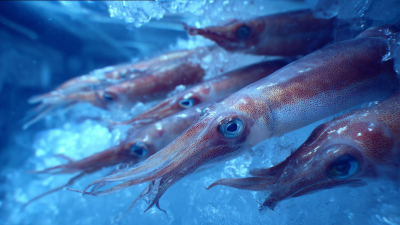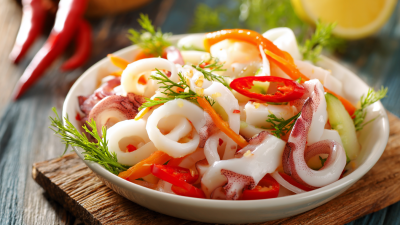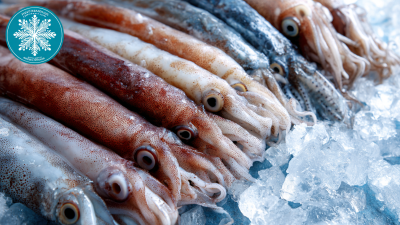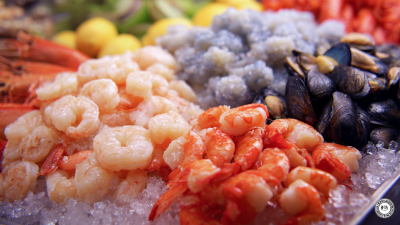The seafood market has witnessed significant growth, with the global frozen seafood segment projected to reach USD 31.93 billion by 2027, according to a recent industry report. Among the myriad of seafood options, the demand for high-quality products like Kami Frozen Squid Ring has surged due to their versatility and popularity in various culinary applications.
 As chefs and retailers increasingly prioritize freshness and quality, sourcing the best Kami Frozen Squid Rings becomes essential for businesses looking to stay competitive. This guide aims to provide comprehensive insights into selecting, sourcing, and optimizing the use of Kami Frozen Squid Rings, ensuring that businesses can meet consumer expectations while enhancing their culinary offerings.
By leveraging industry data and expert recommendations, we will explore the key factors that contribute to securing the finest squid rings for your menu or product line.
As chefs and retailers increasingly prioritize freshness and quality, sourcing the best Kami Frozen Squid Rings becomes essential for businesses looking to stay competitive. This guide aims to provide comprehensive insights into selecting, sourcing, and optimizing the use of Kami Frozen Squid Rings, ensuring that businesses can meet consumer expectations while enhancing their culinary offerings.
By leveraging industry data and expert recommendations, we will explore the key factors that contribute to securing the finest squid rings for your menu or product line.
When sourcing Kami frozen squid rings for your business, it's crucial to understand the quality indicators that define a premium product. The first aspect to consider is the appearance of the squid rings. High-quality squid rings should have a consistent color, bright white with minimal discoloration, signifying freshness and proper processing. Additionally, they should be free from excessive ice glaze, which can indicate previous thawing and refreezing cycles.
Another key factor is the texture of the squid rings. Upon thawing, the rings should feel firm to the touch and have a slight bounce, indicating they have retained their natural moisture and not become mushy. The flavor profile is equally important; fresh squid should have a clean, mild sea taste without any fishy odor.
Tips: Always ask for samples before finalizing a purchase. This allows you to evaluate the quality firsthand, checking for proper texture and taste. Furthermore, inquire about the sourcing and processing methods to ensure sustainability and quality control. Finally, reading reviews and testimonials from other businesses can provide insight into the reliability of the supplier and their products.
When sourcing squid rings for your business, several key factors should be considered to ensure that you obtain high-quality products that meet your needs. First and foremost, the freshness and sourcing practices of the squid are critical. According to industry reports, the global market for canned seafood, including squid, is projected to grow significantly, with the market size expected to increase from $29.66 billion in 2025 to $36.52 billion by 2032. This growth indicates a rising demand for quality seafood products, making it essential to establish reliable supply chains.
Tip: Always ask suppliers about their sourcing locations and harvesting methods. Sustainable sourcing not only supports the environment but can also appeal to conscious consumers, enhancing your brand's reputation.
Another important factor is the clarity of product specifications. Ensure that the size, cut, and packing methods of the squid rings align with your business requirements. Transparency in these details can prevent misunderstandings and ensure that the product meets your quality standards.
Tip: Request product samples before placing bulk orders. This allows you to assess quality and make necessary adjustments to your sourcing strategy. Engaging with suppliers who can provide consistent product quality is vital for your business’s success in a competitive market.
When it comes to sourcing the finest Kami frozen squid rings, finding reputable suppliers is crucial for ensuring quality and consistency in your inventory. Some top suppliers have established a strong reputation for providing premium seafood products that meet industry standards. These suppliers typically offer a variety of frozen squid products, including different sizes and packaging options to suit various business needs.
To help you navigate the supplier landscape, consider these tips:

When sourcing frozen seafood like Kami frozen squid rings, evaluating price versus quality is crucial for business success. Recent market trends indicate that high-quality seafood can command a premium price, often leading to a significant return on investment. According to a 2023 industry report, businesses willing to invest in superior quality seafood products find themselves with better customer satisfaction and repeat purchases, as 76% of consumers are willing to pay more for premium seafood options that ensure freshness and sustainability.
However, balancing cost and quality is not always straightforward. A recent controversy surrounding a popular seafood promotion highlights the risks associated with prioritizing price over quality. As seen with recent issues related to crab products, it’s vital for businesses to vet their suppliers carefully to avoid compromising on quality merely for a reduced cost. The same report also suggests that transparency in sourcing—specifically the traceability of seafood—can enhance consumer trust, drawing more customers to brands dedicated to both ethical practices and high-quality offerings. Thus, businesses must take a holistic approach, ensuring that their seafood selections, like frozen squid rings, meet both quality standards and customer expectations while remaining competitively priced in the market.
When it comes to sourcing frozen squid rings, proper storage and handling practices are crucial for maintaining product quality and safety. According to industry standards, frozen seafood should be stored at temperatures of -18°C (0°F) or lower to prevent the growth of harmful bacteria. Notably, a study from the Food and Drug Administration (FDA) indicates that improper thawing methods, such as leaving seafood out at room temperature, can lead to bacterial contamination, compromising not only the product's quality but also health safety.







